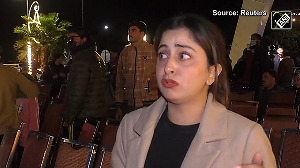
The Pyeongchang Winter Games was supposed to be the coming-out party for 5G, the next generation of wireless technology -- but few people noticed. And some of those who did were unimpressed.
"It was okay," South Korean spectator Lim Seol-hwa said, after visiting a truck outfitted with the technology, one of several demonstrations of 5G's applications at Games venues.
"It was quite real and interesting to try. It would have been better if we could have actually tried it with our own phone."
South Korea's largest telecom, KT Corp, had promoted Pyeongchang as the first "5G Olympic Games in the world", arousing interest from investors, other telecoms firms and networking companies curious to see if the technology is viable and how exactly it would be applied.
KT's marketing also led some Games spectators this month to believe their phones could use super-fast 5G -- though that was never a possibility given 5G-compatible handsets have yet to be sold.
In KT's 5G demonstrations, company representatives show videos demonstrating the speed and capability of 5G, using real-time, 360-degree video of athletes competing. It's a feat that would be impossible on current 4G technology without buffering.
The 5G speeds reached in the trials were four times faster than 4G, according to chip maker Intel Corp, which partnered with KT. It allowed for crisp streaming of the Games' action from all angles with no buffering.
KT also staged a "5G Zone" at venues allowing passers-by to also analyze video in short time slices. About 100 cameras installed around the Olympic ice arena gave 360-degree views for people watching on special tablets, Games organizers said.
While the 5G Zone at the Gangneung ice hockey area was promoted on Pyeongchang's Olympics website, it was not available to attendees during hockey games and was based in an area reserved for Olympic families, making it hard to find.
American hockey fan Ben Dower was one spectator who had failed to spot the trial.
"I don't really know what 5G is," said Dower, who traveled from Washington to watch a game between the United States and neutral Russian athletes. "I've heard of the term but I just don't know how it's different from 4G."
KT spokeswoman Jiyoung Lee said KT had limited marketing rights at the Games and that this in turn had limited its ability to promote 5G as much as the company would have liked.
A spokeswoman for the Pyeongchang Games organisers said in a statement that "KT has exercised their marketing and promotion rights to the fullest through various efforts within Korea".
Canadian athlete charged with stealing car - South Korean police
A Canadian athlete competing at the Winter Olympics has been charged with stealing a car in the early hours of Saturday morning, South Korean police said.
A police official in charge of international crime at Gangwon Provincial Police Agency said the athlete, his wife and manager had gotten into an unlocked car which had been left unoccupied with the engine running in Pyeongchang.
The official said the manager then drove off with the car before it was stopped by police. The manager has additionally been charged with drunk driving.
Once the investigation is complete the results would be sent to the prosecution, the official said, adding that unless the alleged offence was deemed a serious crime, they would be able to leave the country after paying a fine.
At a news conference on Saturday, Canadian Olympic Committee CEO Chris Overholt said they were aware of the situation but declined to confirm the identities of the three.
"We can confirm that an incident occurred involving the police around midnight Friday or early morning Saturday," said Overholt.
"We have confirmation that individuals attached to our team are involved in the investigation and are cooperating. We take this matter very seriously.
"However, until we know the results of the investigation we're not really in a position to comment further."














 © 2025
© 2025